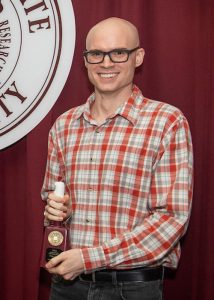ECE Graduate Student Wins NASA FINESST Grant
June 9, 2021

Dylan Boyd, after receiving his ORED Award.
Dylan Boyd, a graduate student in Electrical and Computer Engineering (ECE), was recently awarded funding through Future Investigators in NASA Earth and Space Science and Technology (FINESST). Dylan’s research was one of only 58 proposals selected out of 351 submissions for funding in the Earth Science Division and 835 total proposals. The project will be funded through the grant for three years.
A native of Meridian, Dylan was also awarded the 2021 Bagley College of Engineering Research Award, recognized by Mississippi State at an ORED awards ceremony in April. He was also selected as one of the ECE departments Best Graduate Researchers, chosen from a committee of ECE faculty members.
Dylan’s research, titled “Recycling the radio spectrum: Can anthropogenic signals in LEO be repurposed for science? Advancing soil moisture remote sensing with NASA Signals of Opportunity datasets, forward modeling, and physics-guided machine learning,” is focused on using the radio waves that reflect and scatter all over the planet for science.
Dylan noted that it’s a long title, but he noticed a lot of award winners tend to use titles that also function as an abstract of the project. “I guess it worked!” he joked.
“In this proposal, we’re wanting to make our model work in space so that we can calculate the scattering over Earth’s curvature, hills, valleys, and mountains,” explained Dylan. “We hope to use this model to improve soil moisture estimation from NASA’s satellite measurements of reflected radio waves by combining machine learning with advanced modeling techniques.”
NASA’s FINESST award recently replaced the NESSF Fellowship. A graduate of ECE’s doctoral program, Orhan Eroglu, was a recipient of that grant in 2018. Orhan and Dylan worked together in a class at that time while Orhan was beginning work on his fellowship. “In a lot of ways, this work continues what we were doing with Orhan’s fellowship,” said Dylan. Orhan is now a Software Engineer at University Corporation for Atmospheric Research (UCAR).
Dylan also gives a lot of credit to Dr. Mehmet Kurum, ECE Assistant Professor and Co-Director of the IMPRESS Lab. IMPRESS Lab (Information Processing and Sensing Lab) conducts basic applied research, ranging from the design, building and experimentation of sensing systems to the theoretical analysis, information processing and algorithm development.
For more information about Dr. Kurum, visit here.
The Department of Electrical and Computer Engineering at Mississippi State University consists of 23 faculty members (including 7 endowed professors), 3 clinical faculty, 10 professional and support staff, and over 700 undergraduate and graduate students with approximately 88 being at the Ph.D. level. With research expenditure of the department in excess of $10M, the department houses the largest High Voltage Laboratory among North American Universities. For more detailed information on the department please visit our website www.ece.msstate.edu.
